Select Language

By Wayne Cole
(Reuters) - A look at the day ahead in European and global markets from Wayne Cole
Asian stocks have made a hesitant start to the week, while gold hit a new peak and Treasuries ran into profit-taking on their recent stellar gains. Oil failed to sustain an early rally that followed news of attacks on commercial shipping in the Red Sea.
Three vessels came under attack in international waters on Sunday, while Yemen's Houthi group claimed drone and missile attacks on two Israeli vessels in the area.
The threat to such a major global shipping route could add to inflationary pressure, although the impact seemed limited so far. Notably, oil prices lost early gains and Brent eased around 57 cents to $78.31 a barrel amid doubts that OPEC+ would be able to maintain planned output cuts, particularly by some African countries. [O/R]
At the same time, U.S. oil output is at record levels above 13 million barrels a day and rig counts are still rising. That means the U.S. is producing more oil than Saudi Arabia right now.
A commodity faring better is gold, which surged suddenly this morning to top $2,111 an ounce for the first time before paring the gains to $2,086. [GOL/]
There was no obvious catalyst for the move, leaving dealers suspecting the hidden hand of trend-following CTAs and algo funds following the break of a triple-top around $2,107.
Central banks have also been gold bugs, buying a net 800 metric tons in the year to September in a record for that period. Bulls are now touting chart targets at $2,240 and $2,400.
Market pricing for early and aggressive rate cuts is clearly a positive for non-yielding gold, with Fed fund futures currently implying a 59% chance of a U.S. cut as early as March. A week ago that probability was around 20%.
There are also 125 basis points (bps) of easing implied for all of 2024, up from 80 bps a couple of weeks ago.
In addition, markets are pricing in an 80% chance of the ECB easing in March, although the hawkish head of Bundesbank pushed back against such prospects in an interview over the weekend.
ECB President Christine Lagarde will have her chance to comment in a speech and Q&A later on Monday.
Such extreme pricing leaves the market vulnerable to pullbacks, and both Fed funds and Treasuries ran into selling on Monday. Yields on U.S. two-year notes rose almost 4 bps, but that follows a drop of 40 bps last week.
German two-year bunds also look susceptible to some profit-taking after yields dived 41 bps last week.
Bonds really need U.S. November payrolls on Friday to be solid enough to support the soft-landing scenario, but not so strong as to threaten the chance of easing.
Median forecasts are for payrolls to rise 180,000, keeping unemployment steady at 3.9%.
Many analysts suspect risks are to the upside, with Goldman Sachs tipping 238,000, including a chunk of workers returning from strikes, and a jobless rate of 3.8%.
Key developments that could influence markets on Monday:
- Speech and Q&A by ECB President Christine Lagarde
- Riksbank First Deputy Governor Anna Breman speaks, Riksbank publishes minutes from policy meeting
- German trade data for Oct, Euro Zone sentiment index for Dec. Data on U.S. durable goods and auto sales
(By Wayne Cole; Editing by Edmund Klamann)
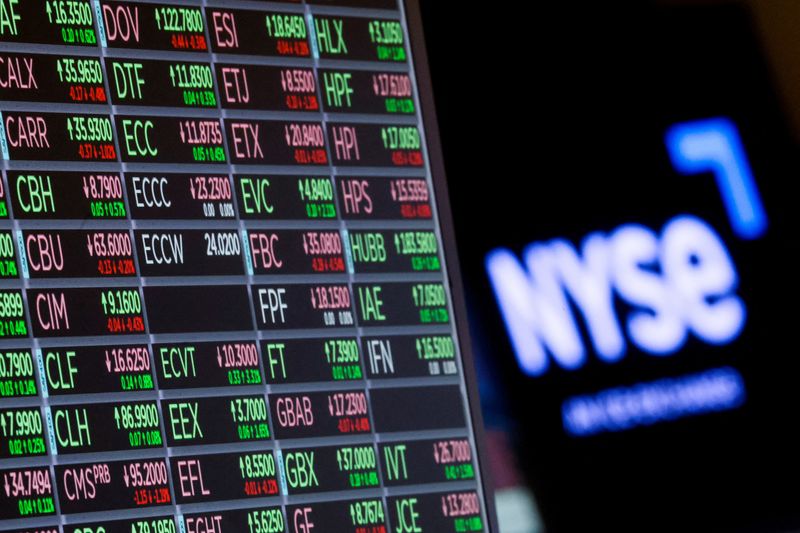
Investing.com -- Friday’s nonfarm payrolls report for November will be in focus this week as investors try to assess whether the U.S. economy is remaining resilient in the face of higher interest rates. Oil prices look set to remain volatile and central bank meetings in Australia and Canada could underline the view that rates have peaked.
1. Nonfarm payrolls
Markets will be eagerly awaiting Friday’s November jobs report to see whether economic growth is continuing to level off.
Too strong a number would undercut bets that the Fed will begin loosening its restrictive monetary policy earlier than expected, presenting an obstacle to the fourth quarter rally in stocks and bonds.
A weak number, on the other hand, could spark fears that the economy is cooling following 525 basis points of rate increases, potentially dampening risk appetite.
Economists expect the U.S. economy to have added 180,000 jobs in November, after 150,000 jobs were created in October.
Separately, data on Tuesday is expected to show the number of job openings moderating in November while Thursday’s initial jobless claims report will be watched for any signs of an uptick in the number of people out of work.
2. Santa rally?
U.S. stocks rallied and the S&P 500 closed at its highest level of the year on Friday, starting December on an upbeat note as investors grew more confident the Federal Reserve is done with rate hikes following comments from Fed Chair Jerome Powell.
Powell vowed to move "carefully" on interest rates, describing the risks of going too far with tightening as "more balanced" with risks of not controlling inflation.
Some investors currently see a strong chance of the Fed delivering a rate cut as early as March 2024 but the market has misread the Fed and economic conditions several times in recent years and may be doing so again.
There will be no updates from Fed officials during the week as the central bank enters the traditional blackout period ahead of its Dec 12 - 13 meeting.
3. Oil volatility
Oil prices slumped more than 2% on Friday on investor skepticism about the depth of OPEC+ supply cuts and concern about sluggish global manufacturing activity.
For the week, Brent posted a decline of about 2.1%, while U.S. crude lost more than 1.9%.
OPEC+ producers agreed on Thursday to remove around 2.2 million barrels per day (bpd) of oil from the global market in the first quarter of next year, with the total including a rollover of Saudi Arabia and Russia's 1.3 million bpd of current voluntary cuts.
OPEC+, which pumps more than 40% of the world's oil, is reducing output after prices fell from about $98 a barrel in late September on concerns about the impact of sluggish economic growth on fuel demand.
The cuts are voluntary, so there was no collective revision of OPEC+ production targets. The voluntary nature of the cuts led to some skepticism about whether producers would fully implement them, and from what basis the cuts would be measured.
4. Central bank decisions
The Reserve Bank of Australia is expected to keep interest rates on hold at its latest policy meeting on Tuesday following a rate hike last month and after data last week showing that inflation slowed in October.
But investors are wary of a hawkish hold, with prices still elevated and new Governor Michele Bullock increasingly seen as more of a hawk than her predecessor.
Elsewhere, the Bank of Canada is expected to keep rates unchanged for a third straight meeting when it meets on Wednesday. Recent data has shown that the country’s economy contracted in the third quarter, indicating the central bank’s aggressive rate hikes are working to curb growth.
Investors may also get some fresh insights on when the Bank of Japan might begin its own, much-delayed tightening campaign from Tokyo CPI data on Monday.
Whether business and the economy could even weather a return of higher interest rates will also be clearer from the Tankan corporate sentiment surveys and GDP data on Thursday.
5. Eurozone data
In the Eurozone, a speech by President Christine Lagarde on Monday will be closely watched for any fresh insights on monetary policy ahead of the bank's upcoming meeting on Dec. 14.
The ECB's pre-decision blackout period starts on Thursday.
The bloc is to release October industrial production figures for France and Spain on Tuesday, followed a day later by Germany and Italy.
Meanwhile German factory order data on Wednesday will give an indication of whether the manufacturing sector in the bloc's largest economy is still in a downturn.
--Reuters contributed to this report
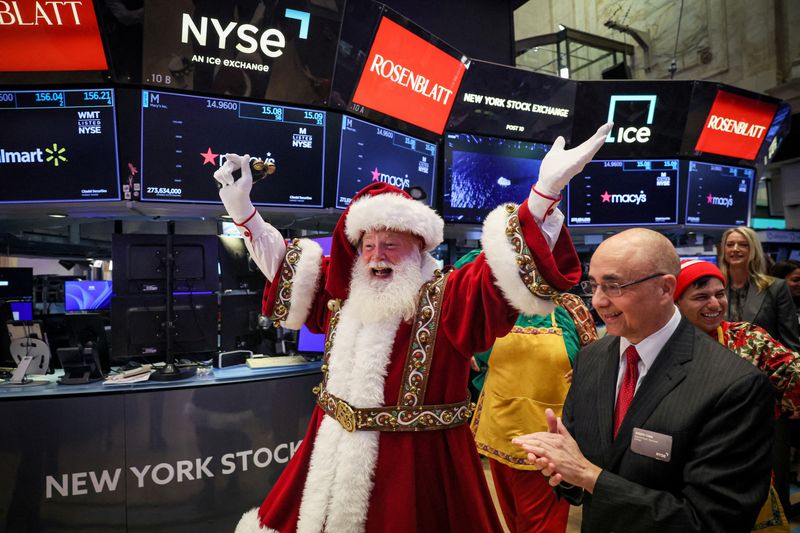
LONDON (Reuters) - Festive cheer has come early to world markets (bar those dollar bulls) on growing certainty that central banks will start slashing interest rates next year.
For sure, key U.S. jobs data will test the exuberance, while Australia's central bank could reinforce a view that rates have peaked.
Here's your week ahead in financial markets from Ira Iosebashvili in New York, Kevin Buckland in Tokyo, Naomi Rovnick and Marc Jones in London and Yoruk Bahceli in Amsterdam.
1/ SANTA'S BEEN
Christmas has come early with global stocks posting their best monthly performance in three years in November and global investment-grade bonds returning almost 4% - the best month on record going back to 1997.
Now, the early Santa rally risks running into a central bank Grinch. Markets price rate cuts as early as the first half of 2024. The U.S. Federal Reserve and the European Central Bank, wary of market euphoria loosening financial conditions, may start to push back.
Whether equities and bonds can rise in tandem next year also feels doubtful. Stocks price in a benign economic scenario of lower borrowing costs and steady growth. Government bonds, which shine in recessions, have been boosted by signs that the impact of previous rate rises is starting to cause pain.
Both cannot be right.
2/ GOLDILOCKS, WELCOME
Will Goldilocks stick around? That's the question investors are pondering as they await the Dec. 8 U.S. jobs report after a rebound that has taken the S&P 500 within spitting distance of a fresh year high.
The data will have to walk a fine line to satisfy the so-called Goldilocks narrative of cooling inflation and resilient growth that has boosted asset prices.
Too strong a number would undercut bets that the Fed will begin easing monetary policy sooner than expected, presenting an obstacle to the searing fourth quarter rally in stocks and bonds.
A weak number, on the other hand, could spark fears that the economy is beginning to roll over following 525 basis points of rate increases, potentially dulling risk appetite.
Economists polled by Reuters expect the U.S. economy to have added 175,000 jobs in November, versus 150,000 in October.
3/ A HAWKISH HOLD?
Cooler than expected consumer inflation has sounded the death knell for any expectations the Reserve Bank of Australia will hike rates on Tuesday.
But investors are wary of a hawkish hold, with prices still elevated and new Governor Michele Bullock increasingly seen as more of a hawk than her predecessor. Traders currently put odds for a hike at the following meeting in February at about 1-in-3.
Some hint of how soon the Bank of Japan can begin its own, much-delayed tightening campaign may come from the Tokyo CPI data, also on Tuesday.
Whether business and the economy could even weather a return of higher interest rates will also be clearer from the Tankan corporate sentiment surveys and GDP data on Wednesday and Friday.
4/ TROUBLE AND STRIFE
First political turmoil in Spain and Portugal and now upheaval in Germany and the Netherlands heralds fresh uncertainty ahead of a jam-packed 2024 election year.
After November's constitutional court blow, Germany faces a 17 billion-euro ($18.54 billion) hole in next year's budget. No date has been set for the budget, so news from Berlin remains in focus and a fiscal correction means the economy is at risk of shrinking for a second straight year.
And coalition talks are stumbling in the Netherlands after far-right, anti-EU Geert Wilders's shock election win.
Turmoil in two EU heavyweights is unwelcome just as the bloc seeks more cash from members and finance ministers meet to iron out new fiscal rules on Friday.
Bond vigilantes are watching for a deal giving leeway for public investments while taking debt sustainability seriously.
All this as the first EU-China summit in four years on Dec. 7-8 looms.
5/ RIDING TIGERS
Emerging market investing sometimes gets likened to riding a tiger - a lot of fun while you are on it but the dismount can be deadly.
November has certainly been the enjoyable part. EM stocks are up 7.5% for their best month since January. Bonds in both local currencies and dollars have made 6%, while a 10% rebound by Israel's shekel and 5-6% rises from central European currencies have hoisted MSCI's EM FX index to its highest since April 2022.
Decembers have been generally kind too. That FX index has risen every December since a dip in 2015 and stocks have made decent gains in three out of the last four.
It will depend on where bond yields and risk premia, or 'spreads', go from here of course, but many of the big investment houses are again sounding hopeful.
($1 = 0.9168 euros)
(Graphics by Pasit Kongkunakornkul, Vineet Sachdev,Riddhima Talwani and Prinz Magtulis; Compiled by Dhara Ranasinghe; Editing by Susan Fenton)

By Devayani Sathyan
BENGALURU (Reuters) -The Reserve Bank of Australia will keep its key interest rate unchanged at 4.35% on Tuesday and a rate cut is now not expected to happen until the fourth quarter of next year due to a strong housing market, according to a Reuters poll.
Even with rates at a 12-year high, Australian home prices have recovered all of their 2022 losses since finding a floor in January. They are expected to rise 8% this year and another 5% next year, a separate Reuters poll showed.
"We expect there will be no change from the RBA next week, but we do think they will maintain a hawkish bias. So they're going to talk up the prospect of rate hikes, but ultimately we don't think they're going to deliver," said Ben Picton, senior strategist at Rabobank.
The interest rate poll, conducted Nov. 29-Dec. 1, showed 28 of 30 economists, including those at Australia's big four banks, expect the central bank will keep its official cash rate on hold on Dec. 5.
Although consumer price inflation in October logged a slower annual pace of 4.9% growth compared with 5.6% in September, that was still well above the RBA's 2-3% target range.
Two economists, however, predicted a 25 basis point hike.
Looking further ahead, 20 of 29 economists predicted the RBA will hold rates steady until end-March while the rest forecast a quarter percentage point hike by then.
Poll medians showed rates on hold until end-September followed by a 25 basis points cut to 4.10% in the last quarter of 2024, one quarter later than predicted in a November survey and putting the RBA behind many of its peers.
The Australian housing market, already one of the most expensive in the world, is expected to maintain steady growth as increasing demand outstrips supply.
Expectations for average home prices in Australia this year have been revised up consistently - from a 9.1% fall in Reuters' February poll to an 8.0% rise in the December poll, underscoring the market's resilience in spite of higher interest rates.
"Multiple consecutive interest rate rises earlier in the year were expected to considerably impact Australia's current mortgage holders. However, distressed sales were relatively minimised due to increasing cash buyers propping up the residential market and the Australian economy continuing to hold full employment," wrote Michelle Ciesielski at Knight Frank, who took part in the Nov. 16- Dec .1 survey of 11 property analysts.
"Compared to the significantly higher migration, the current limited number of new homes being built or being started by developers points to inevitably higher house prices being achieved in 2024."
The poll, which asked about the outlook for home prices in Sydney, Melbourne, Brisbane, Adelaide, and Perth, showed expectations ranging between 3.5% and 7.0% growth for both 2024 and 2025.
Asked about how the ratio of home ownership to renters will change over the coming five years, all nine analysts who responded to the question said it would decrease.
"Affordability looks terrible right now because home prices are back to their record highs and interest rates are at their multi-year highs, which means you're kind of getting hit from both sides," said Diana Mousina, deputy chief economist at AMP (OTC:AMLTF).
"Affordability could improve if prices fall a little bit and it will also improve marginally if the RBA cuts interest rates. But it's not going to improve dramatically unless you see a very big fall in prices by 30%, if not more."
(Other stories from the Reuters quarterly housing market polls)
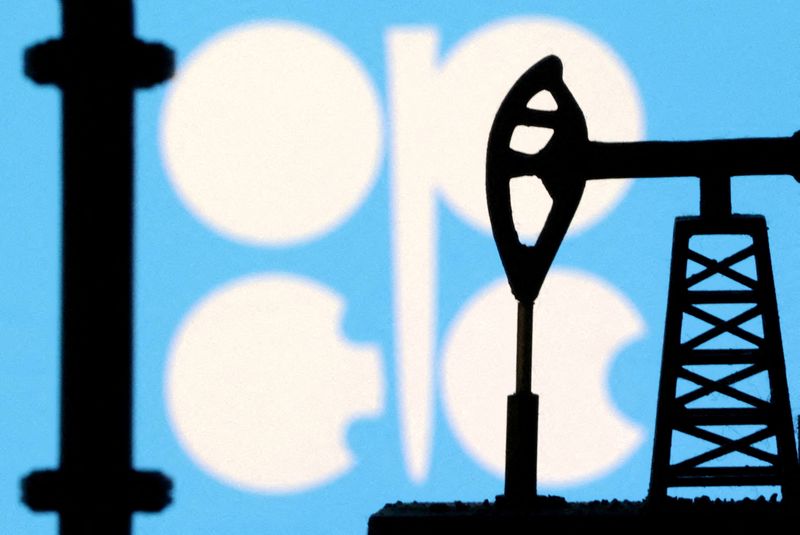
By Alex Lawler, Olesya Astakhova, Maha El Dahan and Ahmad Ghaddar
LONDON/MOSCOW/DUBAI (Reuters) -OPEC+ oil producers on Thursday agreed to voluntary output cuts totalling about 2.2 million barrels per day (bpd) for early next year led by Saudi Arabia rolling over its current voluntary cut.
Benchmark global oil prices settled down around 2% [O/R], in part because the reductions were voluntary and because of investor expectation ahead of the meeting that additional supply cuts might be deeper.
Saudi Arabia, Russia and other members of OPEC+, who pump more than 40% of the world's oil, met online on Thursday to discuss supply policy.
"The market reaction implies disbelief in the full efficacy of the cuts," JP Morgan analyst Christyan Malek said.
"However, setting a new framework for each member to deliver on its cut reflects the degree of trust and cohesion among the members; case in point, the fact Brazil is joining is testament to the strength in numbers for OPEC+."
The group discussed 2024 output amid forecasts the market faces a potential surplus and as a 1 million barrel per day (bpd) cut by Saudi Arabia was set to end next month.
OPEC+'s output of some 43 million bpd already reflects cuts of about 5 million bpd aimed at supporting prices and stabilising the market.
The total curbs amount to 2.2 million bpd from eight producers, OPEC said in a statement after the meeting. Included in this figure is an extension of the Saudi and Russian voluntary cuts of 1.3 million bpd.
The 900,000 bpd of additional cuts pledged on Thursday, includes 200,000 bpd of fuel export reductions from Russia, with the rest divided among six members.
Russian Deputy Prime Minister Alexander Novak said Russia's voluntary cut would include crude and products.
The UAE said it had agreed to cut output by 163,000 bpd while Iraq said it would cut an extra 220,000 bpd in the first quarter.
Saudi Arabia, Russia, the UAE, Iraq, Kuwait, Kazakhstan and Algeria were among producers who said cuts will be unwound gradually after the first quarter, market conditions permitting.
OPEC+ is focused on lower output with prices down from near $98 in late September and concerns brewing over weaker economic growth in 2024 and expectations of a supply surplus.
The International Energy Agency (IEA) this month forecast a slowdown in 2024 demand growth as "the last phase of the pandemic economic rebound dissipates and as advancing energy efficiency gains, expanding electric vehicle fleets and structural factors reassert themselves."
OPEC+ also invited Brazil, a top 10 producer, to become a member of the group. The country's energy minister said it hoped to join in January.
The OPEC+ meeting coincides with the opening of the United Nations' COP28 climate summit being hosted by OPEC member the United Arab Emirates.
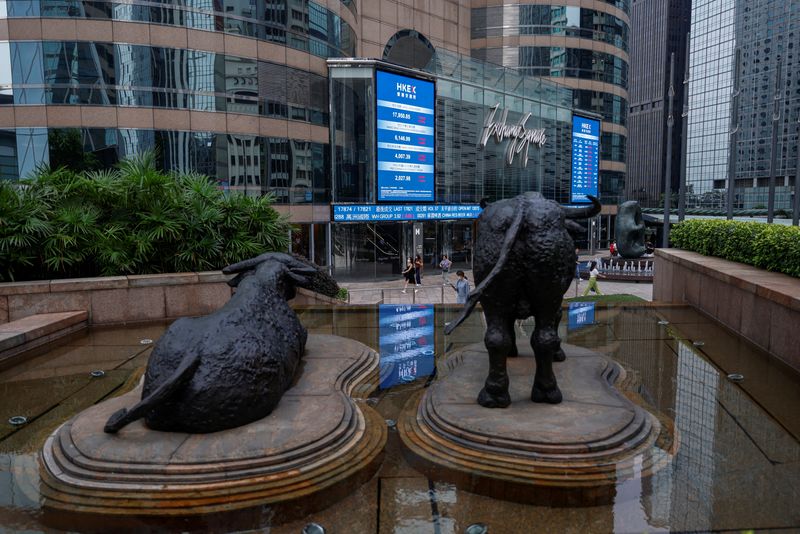
By Stella Qiu
SYDNEY (Reuters) - Asian sharemarkets started the last month of the year on a cautious note after recent strong gains, though growing expectations Europe and the U.S. are poised to cut rates should help ease pressure on local currencies and central banks.
Global oil prices extended losses after a drop of more than 2% overnight as voluntary oil output cuts by OPEC+ producers for the first quarter next year fell short of market expectations. [O/R]
MSCI's broadest index of Asia-Pacific shares outside Japan fell 0.5% after a surge of 7.3% last month, the most since January. Japan's Nikkei was flat, having also jumped 8.5% in November in the best month in three years.
Chinese bluechips dropped 0.6% and Hong Kong's Hang Seng index fell 0.4%.
"Our sense is that quite a lot of the good news is already in the price. A little bit of profit-taking and rebalancing have probably played in the month-end, obscuring the messaging we typically get from the price action," said Rodrigo Catril, a senior FX strategist at the National Australia Bank (OTC:NABZY).
Regional surveys of purchasing managers showed mixed results in November. Japan's factory activity shrank at the fastest pace in nine months, South Korea's factory activity steadied and China's manufacturing industry returned to expansion, based on a private survey.
Overnight, data showed that both U.S. and European inflation are cooling as desired. The Federal Reserve's preferred gauge of inflation - the personal consumption expenditures (PCE) price index - stood unchanged for October, while consumer spending also pulled back.
The major surprise was with euro zone inflation, which missed expectations by a large margin, triggering a slide in the euro and prompting markets to price in rate cuts of about 110 basis points next year, commencing as early as April.
Traders are now waiting for Fed Chair Jerome Powell's Q&A appearance on Friday, with bulls betting the central bank chief will accommodate their early and aggressive U.S. policy easing bets for next year. Fed funds futures imply rate cuts of 115 basis points.
"We suspect this will be a very tightly choreographed session and will stick to the pre-Waller script of caution when it comes to further hikes but with no hint of easing," said Robert Carnell, regional head of research, Asia-Pacific, at ING.
Fed Governor Christopher Waller, deemed a hawk, this week hinted at lower interest rates in the months ahead if inflation continued to ease.
Declining interest rates in Europe and the U.S. would be good news for Asia, greatly easing the pressure on emerging market currencies and allowing room for Asian central banks to ease monetary policy.
Investors are turning more bullish on Asian currencies, a Reuters poll found. Bullish bets on the South Korean won, Taiwanese dollar and Philippine peso were at their highest since early February.
The dollar index hovered near a five-session high at 103.28 against its peers, drawing some support from a sliding euro overnight. That came after a staggering loss of 3% for November, the worst in a year. [FRX/]
The euro rose 0.2% to $1.0907, after tumbling 0.7% overnight to a one-week low of $1.0879.
U.S. Treasuries also eased a little after the best month since 2011. The yield on 10-year Treasury notes slipped 3 basis points in Asia to 4.3264%, on top of a plunge of 52.2 basis points for the month.
Two-year Treasury yields fell 4 basis points to 4.674%.
In the oil market, Brent crude futures slipped 0.4% at $80.56 a barrel while U.S. West Texas Intermediate futures also fell 0.3% to $75.77 a barrel.
Gold prices was 0.3% higher at $2,042.49 per ounce.
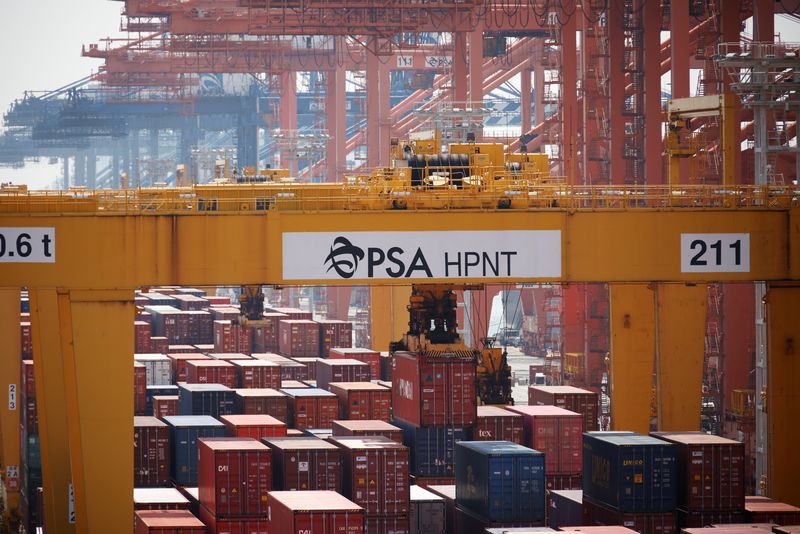
By Jihoon Lee and Cynthia Kim
SEOUL (Reuters) -South Korea's exports beat expectations and accelerated in November as overseas sales of chips rose for the first time in 16 months, adding to evidence global demand is strengthening.
Exports by Asia's fourth-largest economy gained 7.8% year-on-year to $55.80 billion, speeding up from a rise of 5.1% a month before to mark the fastest growth since July 2022 and also beating a 4.7% gain in a Reuters poll of economist forecasts.
Chips exports snapped 15 months of declines and rose 12.9%, in an indication that the slump in semiconductor demand may be bottoming out.
"Exports are surely rebounding thanks to a recovery in chip demand. Car sales are also strong, so we expect overall exports to post a growth of 8% next year," said Lee Da Eun, an economist at Daishin Securities.
"Having said that, momentum behind chip sales isn't as strong as we had expected and there is also downside risks from tepid recovery of the Chinese economy."
South Korean policymakers are pinning hopes on a revival of chip demand to boost growth as restrictive interest rates at home restrain domestic demand.
On Thursday, the Bank of Korea kept monetary policy unchanged and signaled it may need to keep interest rates higher for longer to head off persistent inflation risks.
By destination, exports to the United States jumped 24.7% to log a fourth consecutive month of gains, but shipments to China, its biggest trading partner, declined 0.2%.
Imports fell 11.6% to $52.0 billion, compared with losses of 9.7% the month before and 8.6% expected by economists.
As a result, the country posted a trade surplus of $3.80 billion in November. It was the biggest monthly surplus since September 2021.
Exports for 12 of the country's 15 main export items increased in November, including a 38.5% surge in ship exports. Car exports jumped 21.5%, extending gains to a 17th consecutive month.
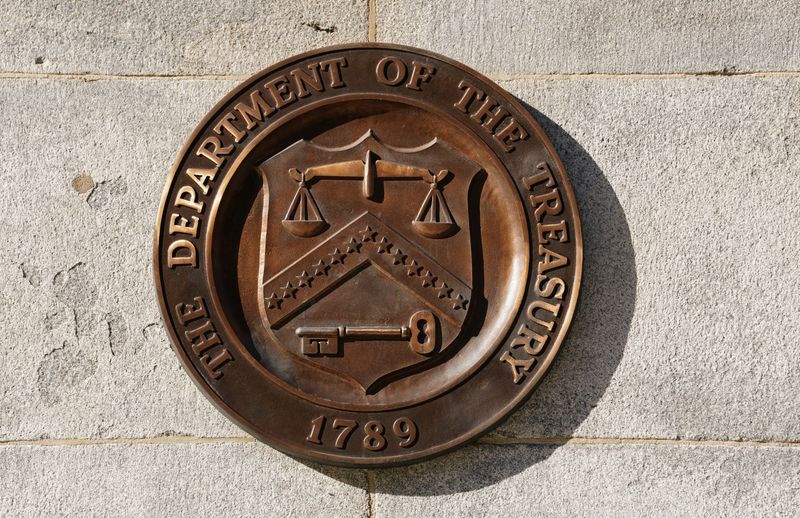
WASHINGTON (Reuters) - The United States on Thursday targeted North Korea with fresh sanctions after its launch of a spy satellite last week, designating foreign-based agents it accused of facilitating sanctions evasion, including revenue and technology for its weapons of mass destruction program.
The U.S. Treasury Department in a statement said it also slapped sanctions on cyber espionage group Kimsuky, accusing it of gathering intelligence to support North Korea's strategic and nuclear ambitions.
Thursday's action, taken in coordination with Australia, Japan and Korea, comes after North Korea last week successfully launched its first reconnaissance satellite, which it has said was designed to monitor U.S. and South Korean military movements.
"Today's actions by the United States, Australia, Japan, and the Republic of Korea reflect our collective commitment to contesting Pyongyang's illicit and destabilizing activities," Treasury's Under Secretary for Terrorism and Financial Intelligence, Brian Nelson, said in the statement.
"We will remain focused on targeting these key nodes in the DPRK's illicit revenue generation and weapons proliferation," Nelson added, calling North Korea by the initials of its official name, the Democratic People's Republic of Korea.
North Korea's mission to the United Nations in New York did not immediately respond to a request for comment on Thursday's sanctions.
Since the launch of the satellite, North Korea said that its leader, Kim Jong Un, has reviewed spy satellite photos of the White House, Pentagon and U.S. aircraft carriers at the naval base of Norfolk. Its state media has also reported that the satellite photographed cities and military bases in South Korea, Guam, and Italy, in addition to Washington.
On Monday, the United Nations ambassadors of the United States and North Korea sparred at the Security Council over the launch and the reasons for growing tensions in a rare, direct, public exchange between the adversaries.
Thursday's action freezes any U.S. assets of those targeted and generally bars Americans from dealing with them. Those who engage in certain transactions with them also risk being hit with sanctions.
The Treasury said Kimsuky primarily uses spear-phishing to target people employed by the government, research centers, academic institutions and others, including in Europe, Japan, Russia, South Korea and the United States.
In October 2020, the U.S. Cybersecurity and Infrastructure Agency (CISA) described the group as "likely tasked by the North Korean regime with a global intelligence gathering mission."
Security researchers have found the group impersonating reporters to trick targets into downloading malicious software to spy on them. Kimsuky's hacking operation has been historically focused on South Korea, Japan and the United States.
In June, the U.S. National Security Agency said the hackers, which have been operating since at least 2012, were "subordinate to an element within North Korea's Reconnaissance General Bureau (RGB)." The RGB is a North Korean intelligence agency that is involved in cyber warfare activities, according to analysts, and is under U.S. sanctions.
Also targeted on Thursday were Iran and China-based representatives of U.S. and UN-designated Green Pine, which the Treasury said is responsible for half of North Korea's arms and related materiel exports.
Two Russia-based representatives of North Korean banks and one China-based representative were also hit with sanctions, among others.
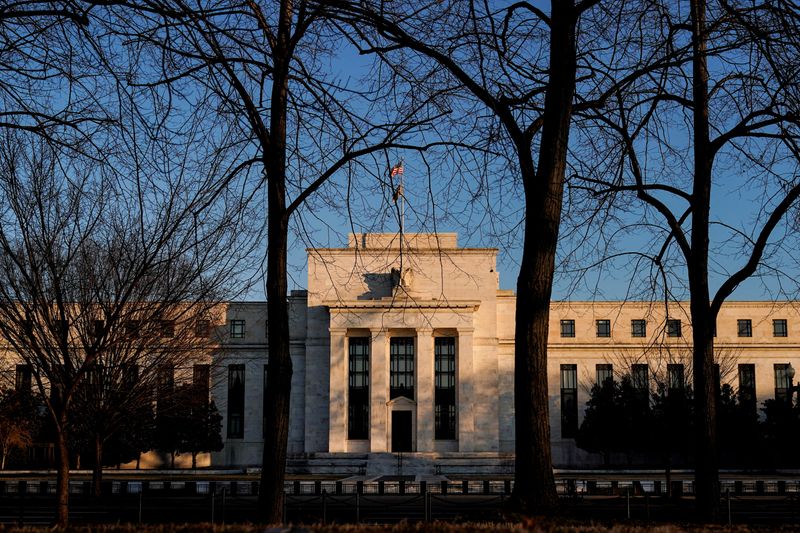
By Naomi Rovnick
LONDON (Reuters) - November has shaped up to be a fairytale month for equities, with the festive Santa rally investors traditionally hope for coming early as traders bet on a Goldilocks scenario of inflation falling and central banks lowering interest rates.
MSCI's world stock index is set to close the month up around 9%, its best performance since November 2020, when markets cheered the arrival of COVID-19 vaccines.
Easing inflation has boosted talk that the U.S. Federal Reserve, the European Central Bank and others are done with aggressive rate hikes, lifting bond and stocks while hurting the dollar.
Global bond prices have soared, with an ICE BofA index of global investment-grade bonds in major markets set to return 3.4% in November, the best month on record going back to 1997..
Yields on U.S. Treasuries, which move in the opposite direction to prices, are set for the biggest monthly drop since 2008.
That's taken the sting out of a summer bond rout, while major stock markets are on track to reverse 2023's sharp falls.
But there's a caveat, warn investors, cautioning that equities could be ignoring the recession risks that typically bode well for safe-haven government debt.
"The equity market is too optimistic right now and bond markets have it right," said Altaf Kassam, head of investment strategy and research, EMEA, for State Street (NYSE:STT) Global Advisors.
"There is still room for interest rates to come down and disinflation to continue but we think for that to happen growth will also slow down and the lagged effect of monetary tightening will come."
BROAD BASED
November's equity rally has been broad based, with Wall Street's S&P 500 8.6% higher on the month and Europe's Stoxx 600 index adding 6%. Global growth stocks in high-tech sectors are up 11% while value stocks, which are mainly in cyclical industries and offer high dividends, have gained 6.5%.
Major central banks have jacked up rates by a hefty 3,965 bps since late 2021 and investors sense a peak has been reached.
Traders are already pricing roughly 100 bps of Fed and ECB rate cuts next year while most big economies have paused rate rises to see how much the tightening bites.
"We've now had this rebound (in equities) and what we need to see is tangible supporting evidence that this is not a head fake policy pivot," said Zurich Insurance Group (OTC:ZFSVF) chief market strategist Guy Miller.
Joost Van Leenders, senior investment strategist at Dutch bank Van Lanschot Kempen, said he expected U.S. and European equities to fall from here as monetary tightening impacts the economy.
U.S. home sales slumped to a 13-year low in October, euro zone bank lending to businesses fell by the first time since 2015 last month as a recession in the bloc looms, while China's economic performance remains weak.
Equity markets are also ignoring the downside of lower inflation, Van Leenders said, because companies that have passed on higher prices to customers have achieved higher nominal growth in revenues and profits.
"It's all the more difficult (for company earnings) when inflation is falling," he said.
And a cloudier outlook for stocks suggests a divergence could open up between again between stocks and bonds.
Until recently eyeing a third year of straight losses, November's rally means government bonds have eked out a 0.7% positive annual return.. The broader global index is set to return 1.6% for the year.
Asset managers had expected a good year for bonds, a scenario that failed to materialise as rates rose further and government and consumer spending buoyed the U.S. economy.
Van Leenders said he expected further gradual falls for Treasury yields. Ten-year Treasury yields, trading at 4.2%, are down from a peak above 5% hit in October. Germany's benchmark Bund yield too has pulled back from recent highs above 3%.
"We're looking for softness in the U.S. next year," State Street's Kassam said. "And on balance we prefer fixed income right now because the lack of growth is what's going to keep equities in check."
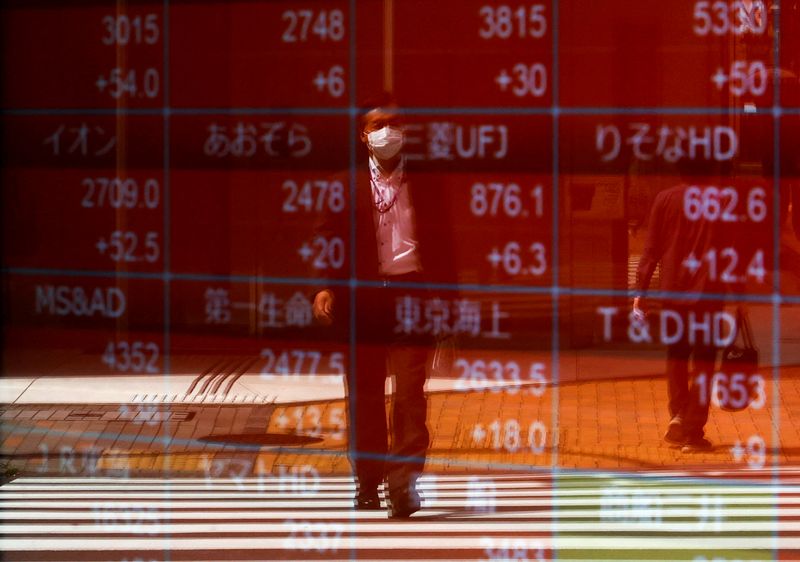
By Kane Wu
HONG KONG (Reuters) -Asian stocks rose on Thursday to clock their strongest performance in 10 months, as investor sentiment warmed on a relatively benign global interest rates outlook and signs of economic recovery.
Europe and Wall Street are also set to open higher with FTSE futures and E-mini futures for the S&P 500 index up about 0.1% each.
The MSCI Asia-ex-Japan stocks index was up 0.1% at 0507 GMT, gaining 6.9% so far this month, setting it on course to mark the best month since January.
South Korea's KOSPI has led the rally in Asia with 10.6% gains this month, followed closely by Taiwan and Japan's Nikkei.
"Seems market participants are clearly taking the no landing and Fed done scenario to heart. Modest China domestic stimulus is having a positive effect," said John Milroy, an investment adviser at Ord Minnett in Sydney.
"Inflation prints and bond markets suggesting the central banks are at least due a pause in the raising cycle. Markets like that."
Hong Kong's Hang Seng Index pared losses to be up 0.1%, while China's benchmark CSI300 Index rose as much as 0.24%, despite disappointing Chinese manufacturing data released on Thursday.
The closely watched factory survey showed manufacturing activity contracted for a second straight month in November and at a quicker pace, suggesting more government support is needed to help shore up growth in the world's second-largest economy.
For the month, the Hang Seng has lost half a percentage point while CSI300 was down over 2%.
Stock markets around the world struggled on Wednesday, after a strong month driven by market expectations of peak Federal Reserve rates, and as a fall in the dollar and in U.S. bond yields loosened financial conditions.
Ten-year U.S. yields are down more than 60 basis points in November, on track for the steepest monthly drop since late 2008.
While U.S. central bank officials on Wednesday sent mixed messages, investors still focused on comments made on Tuesday by Fed Governor Christopher Waller, an influential and previously hawkish voice at the bank. Waller had said rate cuts could begin in months if inflation keeps easing.
Meanwhile, data from the U.S. showed a strong economy in the third quarter and also a downtrend in inflation, reinforcing expectations the Fed might cut interest rates earlier than expected.
"We think liquidity and momentum can still support markets through December," said Redmond Wong, market strategist, Greater China at Saxo Markets, and that rate cuts could be as early as the first quarter as U.S. economy has shown signs of deceleration.
The U.S. personal consumption expenditure inflation report will be released on Thursday.
Fed Chair Powell is also due to speak on Friday and expected to offer crucial insights into the Fed's policy approach ahead of their December meeting.
U.S. financial conditions are the loosest since early September and have eased 100 basis points in a month, according to Goldman Sachs. The bank's global and emerging market indexes ticked up a bit last week, but financial conditions are also looser by around 100 bps from a month ago. U.S. rates futures markets are now pricing in more than 100 basis points of rate cuts next year starting in May, and the two-year Treasury yield is its lowest since July - it has slumped nearly 40 basis points this week alone.
"Absent rapid Fed easing, we expect a more challenging macro backdrop for stocks next year with softening consumer trends at a time when investor positioning and sentiment have mostly reversed," analysts at J.P.Morgan said in a note on their 2024 global outlook.
"Equities are now richly valued with volatility near the historical low, while geopolitical and political risks remain elevated. We expect lackluster global earnings growth with downside for equities from current levels."
Oil prices traded steadily after rising more than $1 on Wednesday ahead of expected production cuts by the OPEC+ group.
U.S. crude pared losses to gain 0.23% to $78.04 per barrel and Brent was down 0.18% at $82.95.
Spot gold slid 0.04% to $2,043.69 an ounce.

